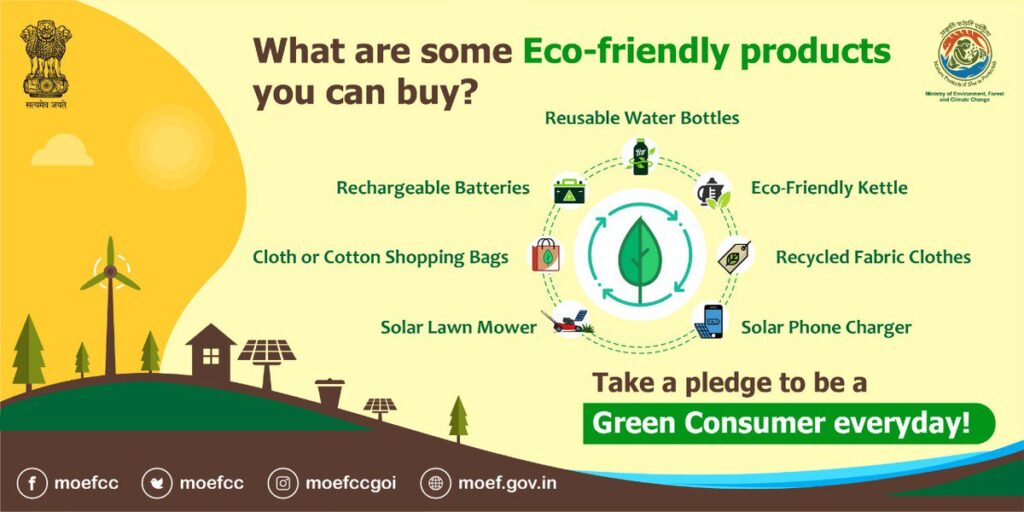Sustainability Trends Shaping Human Behaviour: An overview

Table of Contents
Sustainability has become a major concern for individuals, businesses, and governments around the world.
As the impacts of climate change and environmental degradation become more apparent, there is a growing awareness of the need to take action to protect the planet.
This has led to a number of sustainability trends that are shaping human behaviour, both in terms of how we live our daily lives and in terms of the products and services we consume.
In this blog, we will explore some of the key sustainability trends that are shaping human behaviour.
Green consumerism
Green consumerism refers to making environmentally-friendly purchasing decisions, such as buying products made from sustainable materials, products produced using environmentally-friendly methods, or products with a lower environmental impact throughout their lifecycle.
Green consumerism can also include considering a product’s social and ethical impact, such as working conditions and fair trade practices.
The concept of green consumerism has grown in popularity in recent years as consumers have become more aware of the environmental impact of their purchasing decisions and the role they can play in promoting sustainability.
This is driven by a number of factors, including increasing concern about climate change, growing awareness of environmental issues, and the availability of more eco-friendly products.

Indian governments push for green consumerism.
Green consumerism can take many forms, including:
- Buying products made from sustainable materials, such as organic cotton or bamboo, which are grown without the use of pesticides or chemical fertilisers.
- Purchasing products that have been produced using environmentally-friendly methods, such as solar or wind power.
- Choosing products with a lower environmental impact throughout their lifecycle, such as energy-efficient appliances or LED light bulbs.
- Considering a product’s social and ethical impact, such as working conditions and fair trade practices.
However, it’s important to note that not all products labelled as “green” or “eco-friendly” are truly sustainable or have a lower environmental impact.
Greenwashing is a common practice among companies, making false or misleading claims about the environmental benefits of a product.
Consumers should be vigilant and research products and companies to make sure their green claims are legitimate and look for third-party certifications, such as Energy Star or LEED, that can help identify truly environmentally friendly products.
Green consumerism can be a powerful tool for promoting sustainability, but it’s important to note that it’s not a solution on its own. Consumers also need to consider other factors such as reducing consumption, recycling, and supporting policies that promote sustainability.
Woke Investors
Woke investors, also known as socially responsible investors, are individuals or organisations that incorporate social and environmental considerations into their investment decisions.
This can include avoiding investing in companies that engage in activities that are considered harmful to society or the environment, such as those involved in the fossil fuel industry, or investing in companies that promote social and environmental causes, such as renewable energy or sustainable agriculture.
Socially responsible investing (SRI) has been gaining popularity in recent years as more investors become aware of the impact their investments can have on the world. SRI can take many forms, including:
- Negative screening: Avoiding investing in companies that are involved in activities that are considered harmful to society or the environment, such as those involved in the fossil fuel industry or companies with poor environmental or labour practices.
- Positive screening: Investing in companies that promote social and environmental causes, such as renewable energy or sustainable agriculture.
- Impact investing: Investing in companies or projects that have a specific positive social or environmental impact, such as affordable housing or clean water projects.
Woke investors may also engage in shareholder activism, which involves using their position as shareholders in a company to advocate for change, such as pushing for more sustainable practices or greater transparency on environmental and social issues.
Greenhushing
Greenhushing is a practice where companies or organisations do not disclose or talk about the negative environmental impact of their products, services, or operations to give the appearance of being environmentally friendly.
This can include not disclosing the environmental impact of their products or services, not discussing the environmental impact of their manufacturing process, or not being transparent about the environmental challenges they face and the steps they are taking to address them.
It can be more difficult to detect than Greenwashing, which is the practice of making false or misleading claims about a product’s or service’s environmental benefits, as it relies on a lack of information rather than false or misleading information.
Companies may engage in greenhushing for a variety of reasons, including:
- To avoid negative publicity or backlash from consumers and environmental groups.
- To avoid making significant changes to their products, services, or operations to reduce their environmental impact.
- To avoid having to invest in more sustainable practices and technologies
- To gain a competitive advantage over other companies by appearing to be more environmentally friendly
- To meet consumer demand for environmentally friendly products and services without actually making any changes to their operations
Sustainable transportation
As concerns about climate change and air pollution continue to rise, more and more people are looking for ways to reduce their carbon footprint.
This has led to an increase in the use of public transportation, biking, and walking, as well as the development of electric and hybrid cars.
Additionally, ride-sharing services have become more popular as a way to reduce the number of cars on the road.
Sustainable food
Consumers are becoming more concerned about the environmental impact of their food choices and are looking for ways to reduce their carbon footprint.
This has led to an increase in the demand for organic, locally-sourced, and plant-based food options.
Many consumers are also looking for ways to reduce food waste, such as composting and meal planning.
Green building
As concerns about energy efficiency and the environment continue to rise, more and more people are looking for ways to reduce the environmental impact of their buildings.
This has led to the development of green building standards, such as LEED certification, which help to ensure that buildings are energy efficient and environmentally friendly.
Many homeowners are also looking for ways to make their homes more energy efficient, such as installing solar panels or upgrading insulation.
Sustainable fashion
Consumers are becoming more concerned about the environmental impact of their clothes and are looking for ways to reduce their carbon footprint.
This has increased demand for sustainable fashion, such as clothes made from organic cotton or recycled materials.
Many consumers are also looking for ways to reduce their consumption of fast fashion and invest in high-quality, long-lasting clothes.
Greener Supply Chain
Companies are becoming more aware of the environmental impact of their supply chains and are looking for ways to reduce their carbon footprint.
This includes reducing emissions from transportation and manufacturing, as well as sourcing materials and products from sustainable and ethical suppliers.
Many companies are also looking for ways to reduce waste and improve energy efficiency in their supply chains.
Water Conflicts
As the world’s population continues to grow and the impacts of climate change become more apparent, water scarcity is becoming a major concern in many parts of the world.
This has led to conflicts over access to water resources and has highlighted the need for sustainable water management practices.
This trend shapes human behaviour as more people become aware of the importance of water conservation and sustainable water management.
Water conflicts can have significant impacts on communities and economies. Here are a few examples of water conflicts and their effects:
In the Indus River basin in Pakistan, a lack of water management and distribution agreements between India and Pakistan has led to tensions between the two countries, with both sides accusing the other of overusing and mismanaging the river’s water resources. In addition, the lack of water has had a severe impact on agriculture and food security in Pakistan.
In the Middle East, the Tigris and Euphrates rivers, which flow through Turkey, Syria, and Iraq, have been the source of ongoing conflicts between the three countries. Turkey’s construction of dams on the rivers has led to reduced water flow downstream, affecting the agriculture and drinking water supply in Syria and Iraq.
In the United States, water conflicts have occurred between states over the allocation of water from the Colorado River. The Colorado River Compact of 1922 allocated water from the river to seven western states, but as population and water use have grown, conflicts have arisen over how to allocate this limited resource.
In Africa, the construction of the Grand Ethiopian Renaissance Dam on the Blue Nile River has been a source of tension between Egypt, Sudan, and Ethiopia. Egypt and Sudan are concerned that the dam will reduce the amount of water available to them, while Ethiopia argues that the dam is necessary for its own economic development.
In South America, the construction of the Hidrovia project on the Paraguay-Parana river basin has been controversial, with concerns that it will have a significant impact on the environment, including the displacement of indigenous communities and the loss of important ecosystems.
In conclusion, sustainability is a trend shaping human behaviour in several ways.
From the products we buy to how we invest and live our daily lives, more and more people are looking for ways to reduce their environmental impact.
By being aware of these trends and adapting to them, we can all play a role in creating a more sustainable future.
